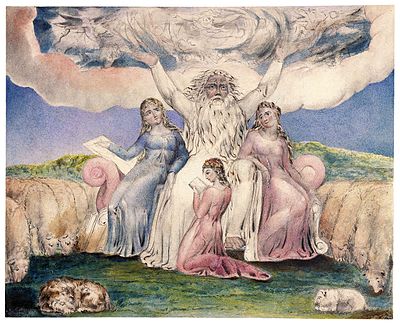This is an old revision of this page, as edited by 92.98.62.252 (talk) at 11:40, 27 January 2018. The present address (URL) is a permanent link to this revision, which may differ significantly from the current revision.
Revision as of 11:40, 27 January 2018 by 92.98.62.252 (talk)(diff) ← Previous revision | Latest revision (diff) | Newer revision → (diff) For other people with the same name, see Jemima (disambiguation).
Jemima (also written Jemimah, Template:Lang-he, Yemimah) was the oldest of the three beautiful daughters of Job, named in the Bible as given to him in the later part of his life, after God made Job prosperous again. Jemima's younger sisters are named as Keziah and Keren-Happuch. Job's sons, in contrast, are not named.
Jemima, along with her sisters, was described as the most beautiful women in the land. Also, unusually and in common with her sisters, Jemima was granted an inheritance by her father, with her brothers as might have been expected (Job 42:15). Apart from these brief references at the end of the Book of Job, Jemima is not mentioned elsewhere in the Bible.
Modern scholarship has cast doubt on the historical existence of the events described in the Book of Job.
The name Jemima means "turtledove".
And he called the name of the first daughter Jemimah, and the name of the second Keziah, and the name of the third Keren-happuch
Possible Arabian queen
The Christian theologian John Gill notes that Jemima may mean either "day" or "dove", the latter by association with the Arabic word يمامة yamāmah. Noting that there is a land in Arabia with the name al-Yamama, which had a queen called Zarqāʼ al-Yamāmah, he conjectures that the Biblical Jemima may be connected with the Yamamah of Arabic folklore.
References
- Carol A. Newsom (29 June 2009). The Book of Job: A Contest of Moral Imaginations. Oxford University Press. p. 39. ISBN 978-0-19-973115-2.
- Tremper Longman III (4 February 2010). How to Read Exodus. InterVarsity Press. p. 90. ISBN 978-0-8308-7865-9.
- Niels Peter Lemche (19 November 2015). Ancient Israel: A New History of Israel. Bloomsbury Publishing. p. 52. ISBN 978-0-567-66280-4.
- Chad Brand; Archie England; Charles W. Draper (1 October 2003). Holman Illustrated Bible Dictionary. B&H Publishing Group. p. 1254. ISBN 978-1-4336-6978-1.
- "Archived copy". Archived from the original on 2010-09-13. Retrieved 2010-09-09.
{{cite web}}: Unknown parameter|deadurl=ignored (|url-status=suggested) (help)CS1 maint: archived copy as title (link)
| Book of Job | |||||||
|---|---|---|---|---|---|---|---|
| Bible chapters | |||||||
| People and entities |
| ||||||
| Places | |||||||
| Phrases/Terms | |||||||
| Related religious texts | |||||||
| In art |
| ||||||
| Other | |||||||
| Sources | |||||||